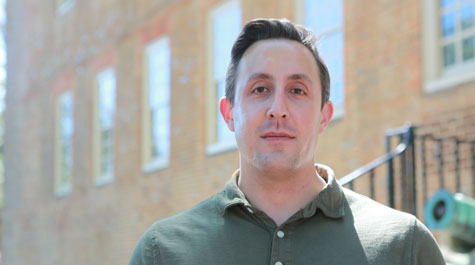W&M philosophy professor makes a moral case for ignoring politics
Voting is an important civic duty, and one is obligated to research candidates and go to the polls, conventional wisdom says.
But not so fast, says Christopher Freiman. There’s actually no need to do any of that.
Freiman, associate professor of philosophy at William & Mary, outlines his reasoning in his new book “Why It’s OK to Ignore Politics.” Just in time for the Nov. 2 elections, he makes an interesting yet controversial case and has experienced blowback because of it.
In a nutshell, Freiman argues that it’s morally better to forgo political participation in favor of more effective forms of altruism.
His book is part of the series “Why It's OK: The Ethics and Aesthetics of How We Live.”
“The basic idea behind the series is philosophers defending things that non-philosophers tend to do, but that philosophers don’t like,” Freiman said.
“So in my case, a lot of people don’t vote. And a lot of philosophers think that they should vote. So I was defending the non-philosophers’ actions against the objections that they get from the philosophers.”
 Freiman’s position is that political participation is generally not an effective way of helping people. If a citizen is interested in doing that, they instead could do things such as raise money for key charities that help improve people’s lives.
Freiman’s position is that political participation is generally not an effective way of helping people. If a citizen is interested in doing that, they instead could do things such as raise money for key charities that help improve people’s lives.
“My basic argument is that you should take the time that you would spend on something like preparing and casting a vote — so researching, debiasing and then actually casting the vote — and maybe work overtime and donate your extra income to a charity like the Against Malaria Foundation, which helps save people’s lives,” Freiman said. “That’s a more effective use of your time.”
In the context of the current polarized political climate in the U.S., Freiman said, he’s taking the view that it’s OK to ignore the whole thing and not even talk about it, read about it or pay attention.
“I think it’s morally permissible to do that, to ignore it,” he said. “And part of the argument for that is simply that it won’t make a difference.”
One can spend hours arguing on social media or with family about politics, but when casting a vote the chances are tiny that it will actually make a difference to the outcome of an election, Freiman said.
“My argument is that you don’t have an obligation to do that because the odds of it actually helping people are very low,” he said. “And in terms of the polarized environment, another thing that I talk about in the book is the way that politics seem to be making us miserable. People literally lose sleep over politics. Their physical well-being suffers. They get anxiety as a result of politics.
“And my thought is that suffering for something that really helps people is often worth doing. So if you lose sleep because you’re working on a cure for cancer, you should lose sleep because you can help a lot of people if you succeed. But in the case of something like political participation — I talk about voting as the main case — you’re basically making yourself miserable for no higher purpose.”
And yes, he’s telling people they don’t need to vote. Given that their one vote isn’t going to make a difference, according to Freiman, a person should ask if they as an individual have an obligation to vote — and his argument is no.
He has heard quite an outcry against his view, and in fact opposition to it has been the standard reaction.
One counterpoint has been, “What if everybody did that?” Freiman makes a distinction between what would happen if everybody stopped voting versus what would happen if a single individual stopped voting, saying there’s no danger that everybody will stop being politically active and voting.
“People sometimes take my argument to imply that politics is not important or it doesn’t have a big impact on people’s lives,” Freiman said. “But I’m not saying that. Clearly it is important and clearly it does have a large impact on people’s lives.
“But there’s a difference between saying this thing is impactful and saying I, as a single individual, can have an impact on this impactful thing. And so everything I say is perfectly consistent with the claim that politics is very morally significant. But that in and of itself doesn’t imply that someone has to go out and vote.”















